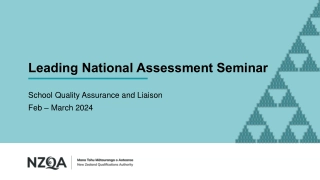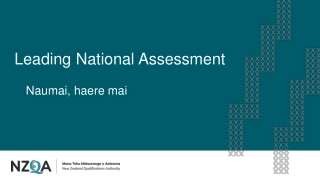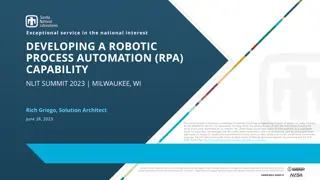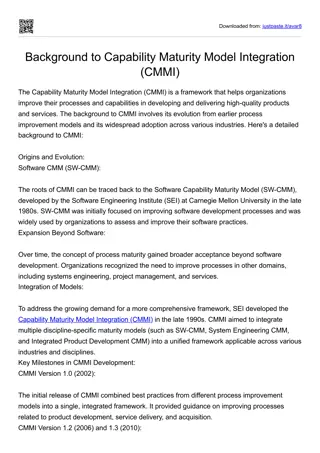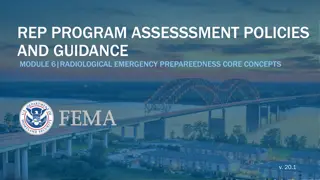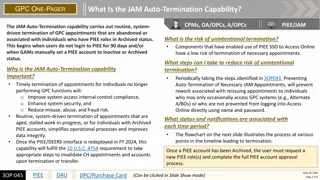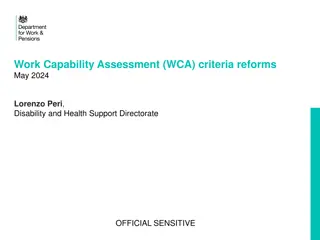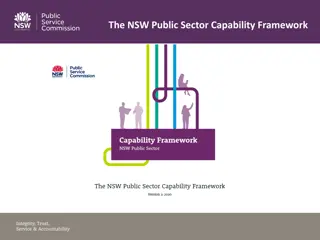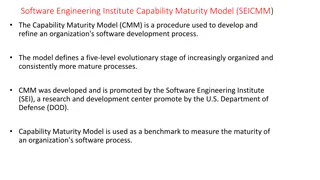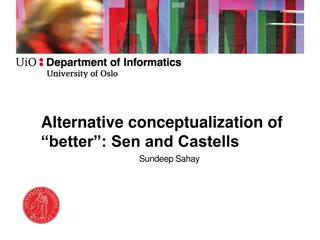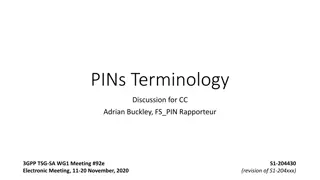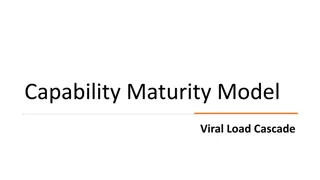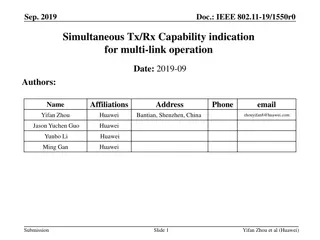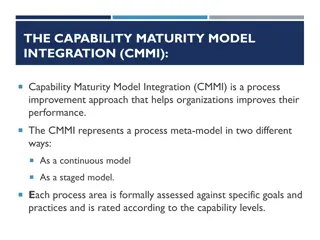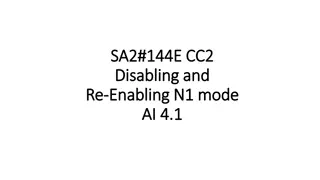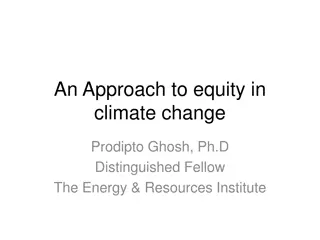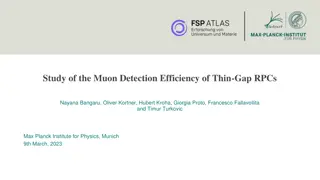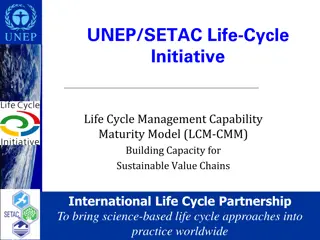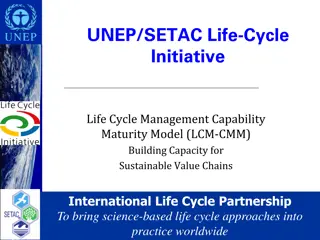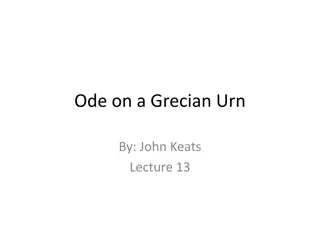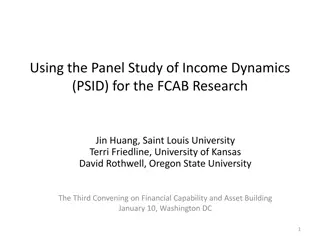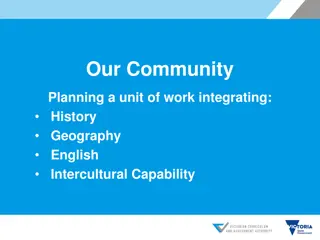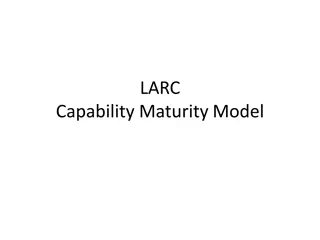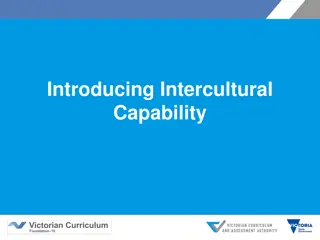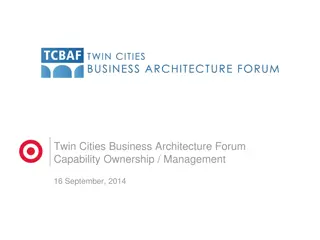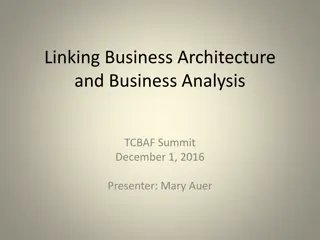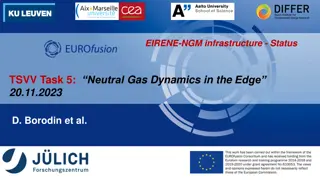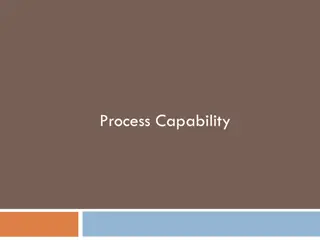NASA Navigation Sensor Technology Assessment Capability
The assessment of navigation sensor technologies for data-driven systems analysis by NASA in October 2023. Discover the motivation, method, survey, simulation model, and selected results of this capability.
0 views • 16 slides
Leading National Assessment Seminar
Explore the upcoming Leading National Assessment Seminar focusing on NCEA Change and Implementation in 2024. Discover key topics such as school quality assurance, teacher capability, and credible assessment practices. Dive into the transition from old to new NCEA standards and qualifications at vari
1 views • 32 slides
Leading National Assessment
Today's mahi involves preparing for the upcoming NCEA Change implementation in 2024. The seminar program covers NCEA Changes, Policies, Readiness planning, Quality Assurance, Corequisites Updates, Pilots & Digital External Assessments. New NZQA Assessment Rules have been published, setting the code
1 views • 37 slides
Sheffield Early Help Assessment Form Update and Integration with Extended Support Plan
Sheffield has introduced an updated Early Help Assessment form to streamline the assessment process within the Early Help System. This new form combines the Early Help Assessment with the Extended Support Plan, aligning various assessment tools and referral forms into one comprehensive document. The
5 views • 22 slides
Developing Robotic Process Automation (RPA) Capability - NLIT Summit 2023 in Milwaukee, WI
This article discusses the initiative of developing Robotic Process Automation (RPA) capability in the national interest at the NLIT Summit 2023 in Milwaukee, WI. The focus is on maximizing efficiency, agility, and effectiveness by implementing RPA to automate digital tasks, reduce manual labor, and
2 views • 20 slides
Background to Capability Maturity Model Integration (CMMI)
The Capability Maturity Model Integration (CMMI) is a framework that helps organizations improve their processes and capabilities in developing and delivering high-quality products and services. The background to CMMI involves its evolution from earlier process improvement models and its widespread
0 views • 3 slides
Radiological Emergency Preparedness Program Assessment Guidance
This module covers the assessment policies and guidance for radiological emergency preparedness programs. It includes key concepts such as metrics for program evaluation, FEMA's assurance determination process, specific demonstration requirements, capability targets, and critical tasks. Participants
4 views • 22 slides
Enhancing Language Learning Through Peer Assessment
Explore the benefits of peer assessment as a valuable tool for language learning, comparing it with self-assessment. Discover the components and challenges of self-assessment, along with the potential of peer assessment to improve accuracy and promote self-regulation. Gain insights into what peer as
3 views • 29 slides
Overview of DSW End Point Assessment Team Leader Level 3
DSW End Point Assessment Team Leader Level 3 provides a clear understanding of the assessment process, ensuring individuals comprehend why and when it occurs, responsibilities involved, and how DSW supports them. It covers topics such as what End Point Assessment entails, assessment design and deliv
1 views • 18 slides
JAM Auto-Termination Capability in GPC Appointments
The JAM Auto-Termination capability in GPC appointments carries out routine, system-driven termination of appointments that are abandoned or associated with individuals in Archived status. This helps improve system-access internal control compliance, enhance security, and reduce fraud risk. Steps ca
0 views • 4 slides
Work Capability Assessment (WCA) Criteria Reforms May 2024
The Work Capability Assessment (WCA) determines if individuals claiming ESA and/or UC have limited capability for work (LCW) or work-related activity. Reforms aim to better support disabled individuals to engage with work. Consultation responses highlighted the need for changes in assessing disabili
0 views • 6 slides
NSW Public Sector Capability Framework Overview
Describes core knowledge, skills, and abilities required for all NSW public sector employees across different levels and occupational groups. The framework includes five progressive capability levels and provides a shared language for effective work performance. It integrates ethical values, non-spe
3 views • 10 slides
Understanding SEICMM - Software Engineering Institute Capability Maturity Model
The SEICMM, also known as the Capability Maturity Model (CMM), is a framework developed by the Software Engineering Institute (SEI) to enhance an organization's software development process. It consists of five maturity levels to assess and improve processes, from initial ad hoc activities to optimi
0 views • 6 slides
Rethinking Development: Perspectives on Human Capability and Well-being
Explore alternative conceptualizations of development beyond economic growth, focusing on human capability and freedom. Learn about Amartya Sen's capability approach and Manuel Castells' perspective on inclusion-exclusion in the Network Society. Discover the Human Development Index, Martha Nussbaum'
0 views • 24 slides
Personal IoT Network (PIN) Terminology Discussion for 3GPP TSG-SA WG1 Meeting
In this discussion, the concept of Personal IoT Network (PIN) and its elements are explored, including the roles of PIN Elements, Configuration PIN Capability, and Gateway Capability. The necessity of gateways to the 3GPP network, device examples, and the distinction of licensed spectrum are also ad
2 views • 10 slides
Capability Maturity Model Cascade and Viral Load Testing Stages
This content discusses the Capability Maturity Model stages, focusing on process improvement and the stages of viral load testing demand creation. It outlines the evolution from initial to optimized stages and the development towards standardized processes in organizations. Additionally, it touches
3 views • 8 slides
Understanding Assessment in Medical Education
Exploring the concepts of assessment in medical education, including defining assessment, types of assessment, reliability, validity, and aligning assessment methods with intended learning outcomes. The importance of constructive alignment and the impact of assessment on learning outcomes are also d
1 views • 12 slides
Assessment Matters in Sociology: Enhancing Learning Through Evaluation
Explore the significance of assessment in sociology education, focusing on key questions to evaluate current assessment procedures, review individual course assessments, and develop strategies to enhance student learning outcomes. Delve into the centrality of assessment in the learning process, with
1 views • 15 slides
IEEE 802.11-19/1550r0: Simultaneous Tx/Rx Capability Indication for Multi-Link Operation
This document discusses the simultaneous Tx/Rx capability indication for multi-link operation in IEEE 802.11-19/1550r0. It covers scenarios where link selection depends on link capabilities, actions needed based on Tx/Rx capabilities, and methods to indicate simultaneous operation. The importance of
4 views • 10 slides
Understanding the Capability Maturity Model Integration (CMMI) for Process Improvement
Capability Maturity Model Integration (CMMI) is a framework that aids organizations in enhancing performance by assessing process maturity levels. It offers continuous and staged models for process improvement, with each level representing specific goals and practices. By following CMMI, organizatio
0 views • 14 slides
Interworking Considerations for N1 Mode Capability in 5G Networks
The article discusses the implications of disabling and re-enabling N1 mode capability in UE operations when transitioning between 5G and 4G networks. It explores scenarios where session continuity may be affected and proposes solutions endorsed by industry stakeholders. Key points include the alloc
0 views • 5 slides
Approach to Equity in Climate Change by Prodipto Ghosh, Ph.D.
Prodipto Ghosh's presentation delves into the terrain of equity in climate change, emphasizing obligations of parties in mitigation, adaptation, and resource transfer. The proposed equity norms highlight cooperation, capability-based resource provisions, and ensuring low-capability individuals stay
0 views • 20 slides
Insights into Managing Assessment in the Classroom by Assessment Research Group
Explore the importance of standards and assessment in education through the lens of the Assessment Research Group. Gain valuable perspectives on curriculum delivery, understanding the assessment system, learner assumptions, task parameters, and more. Discover how language, structure, and agency play
2 views • 25 slides
Enhancing Understanding through Assessment in Educational Design Workshop
Learn and collaborate on assessment practices in education design at the "Understanding by Design Assessment Focus" workshop. The agenda includes sessions on summative and formative assessment, feedback, reporting, and more. Engage in activities like generating questions, finding destination partner
1 views • 76 slides
Study of Muon Detection Efficiency in Thin-Gap RPCs
Conducted at the Max Planck Institute for Physics in Munich, this study focuses on the detection efficiency of thin-gap Resistive Plate Chambers. The research explores the construction, working principles, and experimental setup of RPCs, emphasizing the need for sensitive frontend electronics for hi
0 views • 14 slides
Sustainable Value Chains and Life Cycle Management Capability
The UNEP/SETAC Life-Cycle Initiative focuses on building capacity for sustainable value chains through the Life Cycle Management Capability Maturity Model (LCM-CMM). It emphasizes implementing science-based life cycle approaches globally by transitioning from events to management systems, conducting
1 views • 12 slides
Institutional Assessment Planning Workshop Feedback and Insights
Feedback and insights from a recent institutional assessment planning workshop led by Dr. Mark Nicholas at FSU S. Warren Conference Center & Inn. Participants provided feedback on the usefulness of the content, presenter knowledge, ability to develop assessment plans, post-training assessment knowle
1 views • 9 slides
Understanding Higher Education Assessment: The Complete Guide
Higher education assessment involves a systematic process of collecting, reviewing, and utilizing information to improve student learning and development. This guide covers the assessment cycle, learning outcomes, the mission behind assessment in higher education, what assessment is and is not, reas
1 views • 36 slides
Life Cycle Management for Sustainable Value Chains: Building Capacity and Promoting Innovation
This content delves into the Life Cycle Management Capability Maturity Model (LCM-CMM) aimed at enhancing sustainable value chains globally. It emphasizes the importance of bringing science-based life cycle approaches into practical implementation to address global issues, international standards, c
1 views • 11 slides
Overview of Environmental Impact Assessment and Strategic Environmental Assessment Directives
Environmental Impact Assessment (EIA) and Strategic Environmental Assessment (SEA) play crucial roles in evaluating the impact of planned activities on the environment. This content delves into the concept, origins, development, and key elements of environmental assessment, discussing the legal fram
2 views • 35 slides
Institutional Assessment and Effectiveness Workshop Achievements at SUNY Oneonta
The Office of Institutional Assessment and Effectiveness at SUNY Oneonta has made significant progress in developing assessment protocols and processes, leading to a culture of assessment. This includes completing planning and assessment cycles, establishing objectives and procedures, and aligning u
1 views • 16 slides
Exploring John Keats's Negative Capability Theory in "Ode on a Grecian Urn
John Keats, known for his melancholic temperament, delved into the concept of Negative Capability in his poetry, particularly evident in "Ode on a Grecian Urn." This theory emphasizes the poet's ability to transcend rationality and immerse in intense emotions without the need for analysis or judgmen
0 views • 29 slides
Exploring Asset Accumulation and Financial Capability with PSID Data
Explore the Panel Study of Income Dynamics (PSID) data for research on financial capability and asset building. PSID is a longitudinal survey tracking households since 1968, covering various topics like wealth, savings, pensions, and more. The data allows for studying intergenerational dynamics, wea
0 views • 5 slides
Integrating History, Geography, English & Intercultural Capability in Community Planning
Exploring how to plan a unit of work integrating History, Geography, English, and Intercultural Capability based on the Victorian Curriculum. The unit, "Our Community," spans five weeks and focuses on continuity and change in the local community, significant places, people, and events, and interacti
0 views • 15 slides
Understanding the LARC Capability Maturity Model for Organizational Improvement
The LARC Capability Maturity Model (CMM) focuses on enhancing the viral load cascade, aiming to achieve better patient outcomes and improve institutional capabilities for viral load scale-up. Developed by Carnegie-Mellon University Software Engineering Institute in 1987, the CMM provides a structure
0 views • 14 slides
Enhancing Intercultural Capability in Victorian Curriculum
Victorian Curriculum F-10, released in 2015, emphasizes intercultural capability to develop students' awareness, respect, and skills in cultural diversity. It aims to foster understanding of different cultures, challenge stereotypes, and promote acceptance for a cohesive community. The curriculum st
0 views • 5 slides
Business Capability Ownership Roles and Responsibilities at Target
Explore the journey of developing business capabilities at Target, focusing on ownership roles such as Business Capability Owner, Leader/Manager, Steward, and Stakeholder. Learn how clarity, participation, and executive involvement are essential for successful capability framework creation and utili
0 views • 7 slides
The Connection Between Business Architecture and Business Analysis
Exploring the link between business architecture and business analysis, this presentation delves into the challenges faced by business architects in keeping enablers up to date, establishing a common language, identifying stakeholders, and ensuring traceability. The objective is to facilitate inform
0 views • 17 slides
Development of EIRENE-NGM for Neutral Gas Dynamics in Fusion Reactors
EIRENE-NGM project focuses on enhancing the neutral gas dynamics model for fusion reactor simulations, including efficient HPC utilization, physics basis refinement, database improvement, interface development, and predictive capability validation. Collaborators from various institutes aim to create
0 views • 17 slides
Understanding Process Capability in Quality Management
Process capability is a crucial concept in quality management that evaluates the ability of a process to meet design specifications. It focuses on the relationship between process variation and desired standards, ensuring that products consistently match set criteria. Learn about Cp, Cpk, and other
0 views • 11 slides

